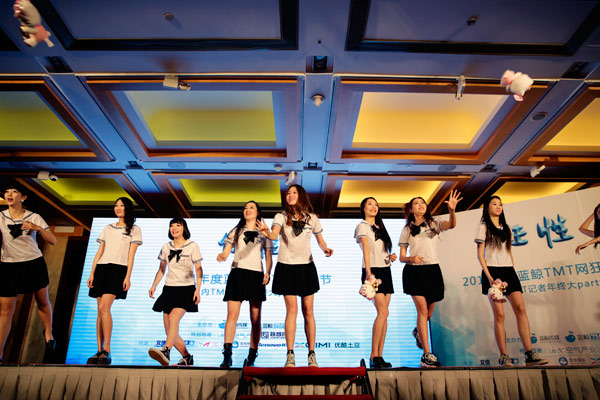Internet players cash in on content windfall
|
 |
|
Representatives from the freelance media, and some from paid-content program platforms, gather in Beijing for a year-end party in 2016. DONG DALU / FOR CHINA DAILY |
A growing Chinese consumer audience has showed it will splash out on the right media and educational programs
Online companies are finally cashing in on infotainment content after years of giving it away for free.
Internet consumers have woken up to the fact that they need to pay for quality audio and visual programing as well as articles on a variety of topics.
To cater for this growing audience, an array of fee-based audio apps have sprung up, dealing with topics ranging from makeup skills to macroeconomics.
"This trend has been boosted by the convenience of online payment (portals) in China," said Liu Duo, director of the China Academy of Information and Communication Technology in Shanghai.
Last year, Chinese consumers spent 212.3 billion yuan ($31.3 billion) on digital content online, including novels, audios and videos.
This was a jump of 28 percent compared to the same period in 2015, data from a report released by Blue Lotus Research Institute in Hong Kong showed.
Figures from the investment bank JP Morgan Chase& Co also revealed that paid content "viewership" is likely to jump from 70 million in the first quarter to 234 million by 2020.
"Users are more willing to pay for quality digital content now," Liu said.
Cultural habits have changed in the past few years from downloading everything for free to paying for the right sort of content by using online services such as Alipay, which is part of Alibaba Group Holding Ltd, and Tencent Holdings Ltd's WeChat Pay.
In turn, this has triggered a new wave of online startups and podcasts like Luoji Siwei, or Logical Thinking, a talk show program.
Wang Xiuqin, a university administration clerk in Shanghai, has been an avid fan for the past six months and watches it on her way to work. She also pays for it, forking out an annual subscription of 199 yuan.
"Work can sometimes contain trivial stuff," the 33-year-old said. "But watching this show opens a window to economics and avantgarde arts. I love it."
Luoji Siwei is aired on Ximalaya FM, which is run by Yu Jianjun, the co-chief executive officer.
In recent years, he has noticed a distinct change in online consumer habits.
"They are maturing and evolving from aimlessly accepting whatever is displayed online to consciously choosing content curators that can promise high-quality programs," Yu said.
Naturally, Ximalaya has moved with the times after initially gaining a faithful following for audio books and user-generated content.
Founded in 2012, the new media company has been pumping more resources into high-quality programing and professional content, although it declined to disclose detailed financial figures.
 |
|
A boy listens to an audio program presented by Ximalaya at a fair featuring audio books and user-generated content in Shanghai. PROVIDED TO CHINA DAILY |
Still, Ximalaya has generated 60 million audio feeds produced by more than 200,000 "experts" from a wide range of fields, including banking, insurance, literature and human resources.
The platform has attracted 370 million subscribers, who are willing to pay an annual fee of between 10 yuan to hundreds of yuan depending on the content.
"Most of these are 'self-help' tips for our viewers and listeners, who value self-motivation and lifelong learning," said Yu, who declined to disclose financial figures such as the company's revenue stream.
Along with rivals Qingting FM, Lizhi FM and Koala FM, Ximalaya dominates the sector with the group carving out about 80 percent of the online audio market, according to consultancy SooToo Research in Beijing.
Again, they have all moved into "professional and part-time user-generated content" by recruiting and training podcasters to produce top quality material.
Qingting FM has signed up more than 12,000 grassroots content creators, online media publication Six Tone reported.
Lene Bao used to work for a multinational cosmetics group and has now started her own business on cosmetic-related marketing. She also serves as a part-time online host at Zhihu Live, which was valued at $300 million in 2015, and has received funding from private equity firm Capital Today and Tencent.
Bao has more than 30,000 followers, and gives beauty, skincare and makeup advice.
"It all started when I wrote a skincare article online and it went viral," she said.
"I realized there was a huge gap between cosmetics companies and their customers, so I decided to bridge that gap," she added.
Bao's main source of income comes from copyright fees for columns, online advice, including a two-minute Q&A session with listeners, which costs just 8 yuan.
She declined to give detailed financial figures, but did say she has a devoted and generous army of followers.
But then, this rise in online paid content has only been possible after the government rolled out tough anti-piracy regulations to tame the wild west web.
"The decision in 2015 to bring in increased anti-piracy rules, and (the government's) subsequent crackdown on illegal video and music sites have laid the groundwork for converting ad-supported users to paid ones," said Liu, of the China Academy of Information and Communication Technology.
There are certainly rich pickings out there in cyberspace for the right content.
On Ximalaya, a podcast on personal presentation techniques captured the imagination of consumers and brought in subscription fees of 5 million yuan.
Back in December, an online 24-hour sale of courses and lectures from a legion of hosts attracted 50.88 million yuan in subscriptions.
Yet only Dedao, or "I Get" in English, is exclusively staffed by professional presenters, as opposed to a mixture of full-time or part-time staff and amateur hosts.
The app, which was launched last year, runs podcasts, which subscribers have to pay for. An eight-minute broadcast each day costs 199 yuan annually, the Wall Street Journal reported.
In just seven months, Dedao has built a 570,000 subscription base for the 16 daily and weekly podcasts, and more than 440,000 subscribers for a weekly column that it sells for just one yuan, the Journal stated.
"We need to change the way we think if we are to keep up with these ever-changing times," Luo Zhenyu, the Beijing-based creator of Dedao, said in his book, Information Overload-I Know How You Feel. "Change can be hard-it pushes us to learn continuously, to understand new things, but it is only in change that we can see the future."









